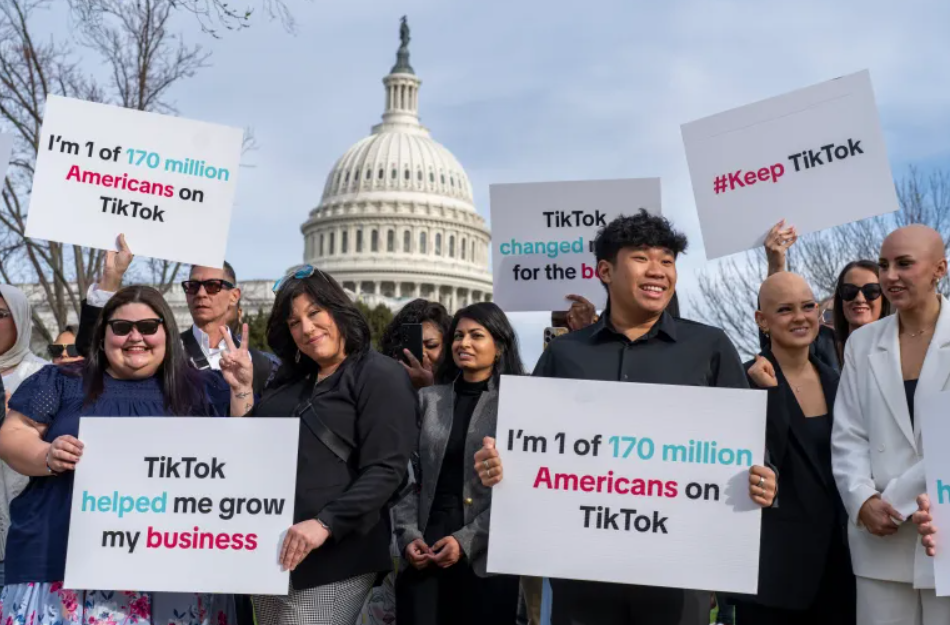Table of Contents
On March 13, 2024, the United States House of Representatives found a possible way to get rid of the famous social media platform through a TikTok acquisition. The developer of the app and Chinese parent company, ByteDance, must sell TikTok to “a qualified buyer.” Moreover, many believe that by “qualified buyer,” the House is alluding to a buyer or group of buyers that is at the very least Western if not U.S. owned. If ByteDance fails to sell TikTok, the app will not be allowed on app stores within the United States anymore. Hence, the race to the TikTok acquisition is on.
Could TikTok be developing a photos app to rival Instagram? Check out the evidence here!
Why does the U.S. Want to Ban TikTok?
Since the last presidential election in 2020, many lawmakers in the United States have believed that TikTok’s developer is controlled by the Chinese Communist Party. Thus, the United States wants to ban TikTok in order to prevent potential foreign influences in future and current elections. Additionally, the United States sees TikTok as a threat to our data privacy as a whole in that many lawmakers believe the app collects and stores our data for nefarious purposes.
TikTok’s CEO, Shou Chew, said in a testimony before Congress that, “ByteDance is not owned or controlled by the Chinese government. It is a private company.”
Marco Rubio, Republican vice chairman of the Senate Select Committee on Intelligence, however, expressed his thoughts on ByteDance and how “every company in China is controlled by the Chinese Communist Party,” at an annual hearing on “worldwide threat assessments.”
The biggest threat, seemingly, is TikTok’s algorithm. Marco Rubio stated that he believes that TikTok’s algorithm “uses the data of Americans” to “read your mind” in order to curate your For You Page (FYP). The TikTok FYP is the home page on TikTok where users begin watching videos. Many believe that TikTok uses user data such as what you like, comment on, and share to curate your FYP.
TikTok’s Appeal
According to Wedbush analyst Dan Ives, the value of TikTok’s U.S. operations can be put at $100 billion. However, interestingly enough, its algorithm becomes a bargaining chip within the sale. If the buyout were to not include TikTok’s algorithm, Ives believes that brings down the value to $40 billion.
In 2023, TikTok’s U.S. revenue was reportedly between $16 billion and $20 billion. While the company is incredibly lucrative, it is currently in the red because of their attempts to grow their e-commerce business, TikTok Shop, and a data security project with Oracle.
Want to use TikTok Shop but don’t know where to start? Check out our ultimate guide to TikTok Shop!
Source: Al Jazeera
TikTok has over 170 million U.S. monthly active users. In comparison with other social media platforms, TikTok is nearly dominating the industry. The only platform to outperform TikTok by monthly active users being Facebook. Additionally, per eMarketer, U.S. adults spend nearly an hour on the app per day. This shows just how engaged an audience TikTok has.
Who’s Who
The most logical buyers in the TikTok acquisition are ByteDance’s non-Chinese investors. These companies would know the company best and would have the money to be able to foot the bill. Some of these investors include General Atlantic, Sequoia Capital, and Susquehanna International Group.
However, outside buyers do still seem interested in the TikTok acquisition. Former United States Treasury Secretary Steven Mnuchin and former CEO of Activision Bobby Kotick are both working to form investor groups. Mnuchin, however, has stated that he would be interested in current investor participation.
Additionally, Shark Tank star Kevin O’Leary shocked viewers last week by declaring live on Fox News that, “TikTok is not going to get banned because I’m going to buy it.” In his plan for a TikTok acquisition, he wants to appoint an American CEO and board, move the app’s servers to the U.S., and rewrite the code to “shut out the Chinese backdoors.”
Closing Thoughts
In 2020 and 2021, Microsoft and, in a dual effort, Oracle and Walmart, all tried and failed to buy TikTok. Microsoft’s attempt, though non-compulsory, was cut short, whereas Oracle/Walmart’s was compulsory. Is the third time the charm or will TikTok emerge unbuyable?
As we wait to see what happens with the bill in the senate thus far, it is important to note that there has been no public evidence brought forth that TikTok has collected users’ data in order to use it maliciously. So for now, all there is to do is to wait and see.
























